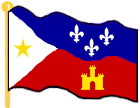La chanson de Mardi Gras
"The Mardi Gras festival came about as a 'last day before lent; Catholic time of fasting', leading up to Easter. Many Catholics in Cajun Country, give up drinking, as their penance, and some give up eating their favorite foods, such as Gumbo.
The Courir de Mardi Gras dress up in brightly colored costumes and ride horseback, around the Town to ask the farmers for a donation to make Gumbo when they return to the center of town. The wives traditionally make the Gumbo. The Captain of the Mardi Gras tells them to hold back and wait til he gives the signal to stampede onto the farm. The Captain asks the farmers to donate chicken, sausage, rice or Roux to make the Gumbo. If the farmer says yes, then, the Captain waves his flag to signal the Courirs to come on; many times, the farmer gives them a live chicken, but, they have to chase it to get it.
As a show of appreciation, the Mardi Gras wagon of singers, accordion players, harmonica and triangle players perform for the farmer and the Mardi Gras riders dance for the farmer; some dance on the saddle of their horse.
Once they have circled the Town, making 30+ stops, they return to the center of Town and everybody dances and of course, they drink. The song is not about drinking, only about their travels and the charity for the Gumbo." -Tami Landreneau
La chanson de Mardi Gras
The Mardi Gras Song
Mardi Gras Song
Mardi Gras Song
(Cajun French)
(English)
Les Mardi Gras* ayoù viens-tu?
Tout à l'entour du fond du verre?**
On vient de l'Angleterre, O mon cher,
O mon cher,
On vient de l'Angleterre,
Tout à l'entour du fond du verre.
Les Mardi Gras quoi portes-tu?
Tout à l'entour du fond du verre.
On porte que la bouteille, O mon cher,
O mon cher
On porte que la bouteille,
Tout à l'entour du fond du verre.
Et la bouteille est bue
Tout à l'entour du fond du verre.
Il reste que la demie, O mon cher
O mon cher,
Il reste que la demie,
Tout à l'entour du fond du verre
Et la demie est bue
Tout à l'entour du fond du verre.
Il reste que le plein verre, O mon cher,
O mon cher,
Il reste que le plein verre
Tout à l'entour du fond du verre.
Et le plein verre est bue
Tout à l'entour du fond du verre.
Il reste que le demi verre, O mon cher,
O mon cher,
Il reste que le demi verre
Tout à l'entour du fond du verre.
Et le demi verre est bue
Tout à l'entour du fond du verre,
Et le demi-verre est bue
Tout à l'entour du fond du verre.
Il reste que la rinçure, O mon cher,
O mon cher,
Il reste que la rinçure
Tout à l'entour du fond du verre.
Et la rinçure on la boit pas, O mon cher,
O mon cher,
Et la rinçure on la boit pas,
Tout à l'entour du fond du verre.
Bonjour le maître et maitresse
On vous demande un peu de chose
On vous demande la fille aînée
On va la faire faire une bonne chose
On va la faire chauffer ses pieds.
Mardi Gras*, where do you come from?
All around the bottom of the glass?**
We come from England, oh my dear,
Oh my dear,
We come from England,
All around the bottom of the glass!
Mardi Gras, what are you bringing with you?
All around the bottom of the glass.
I'm bringing a weary bottle, oh my dear,
Oh my dear
I'm only bringing a weary bottle
All around the bottom of the glass.
And the bottle is drunk,
All around the bottom of the glass.
Only half is left, oh my dear
Oh my dear,
Only half is left,
All around the bottom of the glass.
And the half is drunk,
All around the bottom of the glass.
Only the full glass is left, oh my dear,
Oh my dear,
Only the full glass is left.
All around the bottom of the glass.
And the full glass is drunk,
All around the bottom of the glass.
There is only half a glass, oh my dear,
Oh my dear,
There is only half a glass,
All around the bottom of the glass.
And the half glass is drunk,
All around the bottom of the glass,
And the half glass is drunk,
All around the bottom of the glass.
There are only the dregs, oh my dear
Oh my dear,
There are only the dregs,
All around the bottom of the glass.
And the dregs, we won't drink, oh my dear,
Oh my dear,
And the dregs, we won't drink,
All around the bottom of the glass.
Hello to the master and the mistress,
We ask you for a little something
We ask you for the oldest daughter
We're going to make her do something nice
We're going to make her warm up her feet***!
Notes
*Mardi Gras means Fat Tuesday, the last day before Lent but also refers to the costumed people also called "masqués" (masked ones).
**There's a variant that goes, "Tout à l'entour du fond d'hiver" (All around the end of winter).
***By getting her to dance!
Comments
The Tee Mamou version of "La Chanson de Mardi Gras" is believed to have its origins in a French song from about 400 years ago.

Though the households to be visited along the route are pre-arranged, the capitaine asks permission from the head of the house for the Mardi Gras to enter. When the capitaine waves his flag, the Mardi Gras dismount the truck and approach the house, chanting their song in unison. The Tee Mamou song, different from the better known versions of Basile or Mamou, is performed without instruments and is closely related to an ancient New Year's Eve begging song found in France, French Canada." -Eric Breaux
Thanks!
























